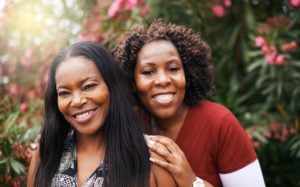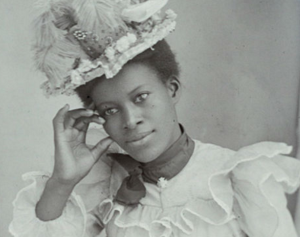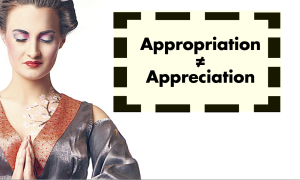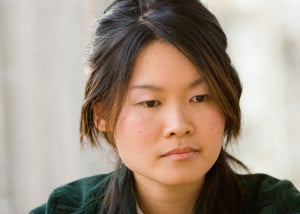
Two smiling people pose together in front of lush tropical flora.
Originally published at The Establishment and republished here with their permission.
When I was a teenager, I met the person who would become my husband – who would later become my wife.
Our first meeting took place in our high school psychology class, and we soon became friends, talking a lot on the phone, as teenagers did back then. We dated briefly, but our relationship was short-lived.
After some time apart after I went off to college, we reconnected, and after that, it all happened quickly: Our relationship bloomed, we fell in love, and we moved closer to one another to be together.
After three years, I was proposed to. I knew this was who I was supposed to marry, because we had split up once and gotten back together, unable to be apart.
But when my spouse came out to me as transgender, and later transitioned, my world was thrown upside-down.
There was a lot that changed, but what I didn’t anticipate were the questions and public scrutiny that would surround my sexuality. I had only ever identified as straight, but by staying in a marriage with a trans woman, this identification was challenged.
According to queer people, I had to identify as a lesbian in order to validate my wife’s gender identity. But according to the court of public opinion on the Internet, by doing this, I would single-handedly prove the conservative opinion that queer people can change their sexuality – that being queer is a choice.
Straight people just had questions. They couldn’t wrap their heads around how I could be attracted to my wife when I was, for all intents and purposes, only attracted to men.
So what am I, and where do I stand? What does this say about the nature of sexuality? Is this about love, or is sexuality truly fluid and our physical attractions change over time?
Well, I don’t have all the answers, but I’ve been forced to dig deep and make evaluations both of myself and of society as a whole. And as a result of much introspection, I’m beginning to look at sexuality as more fluid than people seem to realize it is.
I have a friend who identified her whole life as a lesbian, but fell in love with and married a man. I know a person who, after divorcing her husband, ended up in a relationship with her best female friend. I have multiple friends who left straight marriages when they realized they were gay.
I know other women like myself whose spouses’ transitioned genders, and who stayed post-gender confirmation surgery. I can’t speak to their experiences or sexuality, but I can say that I personally stayed because I loved my husband and I knew I could love my wife as well.
My spouse, regardless of gender, makes me laugh, is kind to others, is politically active, shares the same political opinions as me, and has the same geeky loves as I do, including, but certainly not limited to, Harry Potter, Star Wars, and Doctor Who. We had a great life together and a beautiful son.
I didn’t want to leave. And so, I stayed.
Physical differences in my wife are becoming more apparent by the day. At first, it was the removal of hair, the application of makeup, and the growth of her head hair. Then came the changes of medical transition: the growth of breasts, the development of hips and a waistline, and the softening of her facial features.
Through these changes, I’ve remained attracted to my spouse. I find her new look to be beautiful in the way I have always been able to find other women beautiful, but the attraction is deeper since we have an emotional connection as well. The fact that I love her and care about her deeply translates into physical attraction. Our love was always more than skin-deep.
I joke that I married her so that my children would have her eyes, and that is one part of her physical appearance that hasn’t changed. She still has those beautiful blue eyes, with those gorgeous long eyelashes.
There was a time when I mourned the loss of her more manly features – even her chest hair, which ironically prior to coming out I was not a huge fan of – but that longing is gone.
I don’t understand why or how I still find her sexually attractive; all I can say is that I do. It doesn’t mean I find cis women appealing in the same way, which is why this attraction may stem from the love I had for my wife prior to transition.
Staying with a trans woman means going against what we’re taught by society about sexuality and gender. In an ideal world, people would fit nicely into one category: gay, straight, bisexual – but they don’t. I learned this the hard way, by being thrust into the world of unknown sexuality.
And now, having explored my sexuality in an entirely new way, I wonder: If people weren’t put into these boxes – if people truly were able to enjoy what they do and love who they love regardless of gender identity or orientation – what would the world look like? Would it be a better place? Would everyone be happier?
At the end of the day, all I know is that sexuality is deeply personal and private. I know that I now identify as queer, and that no well-defined box can contain me.
And, really, that’s all anyone needs to know.
***
To learn more about this topic, check out:
- How The Tobacco Industry Exploits LGBTQ People
- Depression-Busting Exercise Tips For People Too Depressed To Exercise
- We Have To Create A Culture That Won’t Vote For Trump
[do_widget id=’text-101′]
Amanda Crose is a former kindergarten teacher who is now an Ed.D candidate in reading, as well as a work-at-home mom who cares for other children. She is the wife of a transgender woman, and mother of two adorable children. In her free time she enjoys reading, running, and researching rheumatism. Read her articles here.
Search our 3000+ articles!
Read our articles about:
Our online racial justice training
Used by hundreds of universities, non-profits, and businesses.
Click to learn more




















